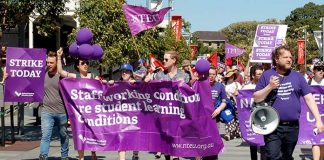Over a month ago students at the Academy of Fine Arts in Vienna held a protest and occupied their main auditorium. Since then the occupation movement has spread to universities in nine Austrian cities, 20 German cities and three Swiss cities.
Students are angry about their deteriorating studying and living conditions, the re-introduction of tuition fees, new university entrance restrictions and the “Bologna process”—an EU program designed to standardise university courses to make them more “competitive”, which has led to funding cuts.
In the 2006 election campaign the Austrian Social Democrat party promised to abolish university tuition fees, but they won the election and the fees remain in place. Anger among students seething under the surface was triggered by the economic crisis.
With more than half of Austrian students forced to work while they study. As unemployment rises, students are furious that while they are suffering the effects of the economic crisis, the banks are receiving billions of dollars in bailouts.
At the end of October 10,000 students marched through Vienna behind the slogan “More money for education, not for banks and corporations”. More recently in Germany 80,000 students took to the streets, declaring “Education is not for sale”.
The Austrian Minister for Science, Johannes Hahn, has tried to diffuse the situation by offering an emergency €34million ($55.8 million) to universities with the biggest student increases. The students say they will accept nothing less than €1billion ($1.6 billion), but the Minister is refusing to make any further concessions.
A “university dialogue” was scheduled for end of November, where 50 people from government and university administration were to discuss the future of higher education in Austria. But only three student representatives were allowed to attend, and they have not been elected by students, but appointed by the Austrian National Student Union.
More important are the debates taking place among students about whether to push for an all out university strike and elect a leadership, and the relationships they are building with unions. The metal workers, printers, engineers and teachers unions have all expressed solidarity with the students, and the students are supporting current union struggles for higher wages.
The more these struggles can unify, the more hope there is that both student and worker demands will materialise.
By Erima Dall





